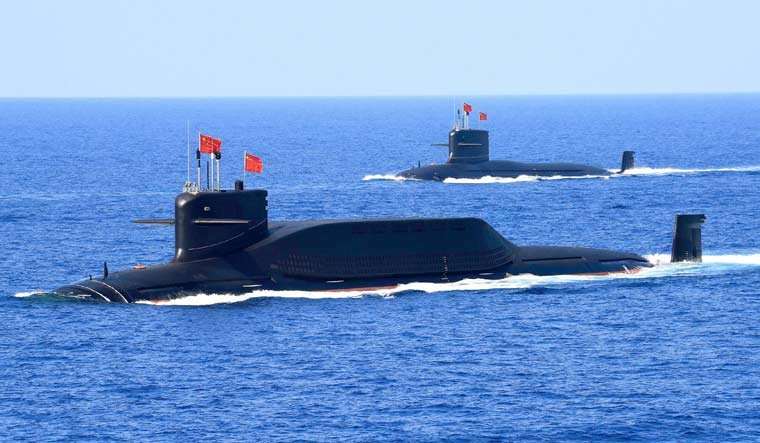Beijing- The new “Big Brother” of the Indian Ocean?

One of the busiest water routes in the world, the Indian Ocean is of utmost significance as a means of connectivity and flow of trade. Acting as a bridge to the Middle East, Africa, and South Asia with the rest of Asia and Europe, it accounts for about 40% of the passage of the world’s oil supply. For India, it is of paramount importance as most of its trade is carried out through sea. It also acts as a natural barrier to India’s territorial defences. All in all, the ocean plays an important character in defining the national security of India. Noting its significance for the country, India plays a key role in maintaining cooperation in the region as a “big brother”.
However, in recent years, China has changed the geopolitical status of the Indian Ocean Region through its Belt and Road Initiative (BRI) which involves the South China Sea and the Indian Ocean. Many Asian countries have signed the connectivity project and they have seen a massive increase in the activities of China in domestic spheres too. It has been able to establish a firm hold for itself, thereby threatening the position of India in these countries which were once highly dependent on India. Following this, two island nations have drastically altered their foreign policies: Sri Lanka and the Maldives.

China and Sri Lanka share a cordial relationship owing to their history where Colombo highly supported Mao’s Communist government. The ties further bolstered during Colombo’s twenty-six-year civil war where Beijing provided resources to help counter the heavily-armed Tamil Tigers. Since then, China has proven to be an important partner to Sri Lanka. After the end of the civil war, Beijing actively participated in the renovation process through hefty investments and starting up new projects amounting to around $15 billion. The investment which was a meagre $16.4 million in 2005 rose to $338 million by 2015. Of the many projects, two highly important investments were made in the Hambantota Port Development and the Colombo Port Project. SriLanka is one of the important partners of the BRI projects due to its geostrategic location. China also remains the largest supplier of arms to Sri Lanka since the 1950s.

Similar to Sri Lanka, the island state of Maldives is an important member of the BRI. The relationship which started in 1972 strengthened after the visit of President Xi’s visit to the Maldives in 2014, the first-ever by a Chinese leader. China has become the largest source of tourists in the Maldives.
The ever increasing influence of China in these nations could prove detrimental to India. China has invested millions of dollars in these countries for its own benefit. The loans granted are provided at extremely high rates which becomes difficult to pay back, failing which China exercises its debt-trap policy. The Hambantota Port in Sri Lanka is the perfect example of the same. The failure to repay the debts eventually allows China to take over major aspects of the debt-ridden country, sometimes with serious implications in the internal matters of the state.
Being the big brother of the region, India has certain responsibilities to fulfil in order to secure its neighbours. China’s increasing proximity to the two nations could encircle India and help China in achieving its ambitions of BRI. China’s assistance to these countries has resulted in more dependence on the dragon than the big brother itself. India should strengthen its ties with its neighbours to secure its position in the region. It should increase its investments, preferably with rational interest rates so that the countries can build their trust on India and believe in its genuine goodwill to help them.
There should be frequent meets between the leaders of the states. After a victorious win in the second term, Modi’s first overseas visit was to the Maldives and Sri Lanka. This proved to be an important gesture to reflect the special relationship that the countries share. In the Maldives, the leaders signed a large number of memorandums and agreements to focus on expanding maritime security cooperation covering hydrography, exchange of white shipping information and a coastal radar system linking the Maldives to India’s larger surveillance network. They also inaugurated a training facility for the Maldives National Defence Force in Maalifushi.

In Sri Lanka, Modi reaffirmed its support to the country to fight against terrorism, following the Easter Sunday attacks. They also held discussions on counterterrorism, security, and economic development. These visits were a way of redeeming its position in the region that has been shaken by China’s influence and assuring its solidarity and support to the nations. This has given India an opportunity to regain what is lost and it is important that it takes necessary actions to work on its relationship with long-term commitments in both countries.
References:
- Roy-Chaudhury, S. R.-C. S., & University of Oxford. (n.d.). India’s National Security Challenges: The Growing Chinese Footprint in Sri Lanka and the Maldives. Retrieved from https://smallwarsjournal.com/jrnl/art/indias-national-security-challenges-growing-chinese-footprint-sri-lanka-and-maldives.
- Smruti S. Pattanaik (2019) India’s Policy Response to China’s Investment and Aid to Nepal, Sri Lanka and Maldives: Challenges and Prospects, Strategic Analysis, 43:3, 240-259, DOI: 10.1080/09700161.2019.1616372. Retrieved from https://www.tandfonline.com/action/showCitFormats?doi=10.1080%2F09700161.2019.1616372



















